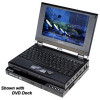Toshiba U105 User Guide - Page 116
Disposing of used batteries
 |
View all Toshiba U105 manuals
Add to My Manuals
Save this manual to your list of manuals |
Page 116 highlights
116 Mobile Computing Disposing of used batteries ❖ If you have extra battery packs, rotate their use. ❖ If you will not be using the system for an extended period, more than one month, remove the battery pack. ❖ Disconnect the AC adapter when the battery is fully charged. Overcharging makes the battery hot and shortens its life. ❖ If you are not going to use the computer for more than eight hours, disconnect the AC adapter. ❖ Store spare battery packs in a cool dry place out of direct sunlight. Disposing of used batteries When a battery pack nears the end of its life, its ability to hold a charge will decrease. When the battery pack needs to be replaced, the main battery light flashes amber shortly after you have fully recharged the battery. You must discard a battery if it becomes damaged. Never attempt to dispose of a battery pack by burning or by throwing it into a fire, and never allow exposure to a heating apparatus (e.g., microwave oven). Heat can cause a battery pack to explode and possibly cause serious injury. Always dispose of used battery packs in compliance with all applicable laws and regulations. Put insulating tape, such as cellophane tape, on the electrode during transportation to avoid a possible short circuit, fire or electric shock. Failure to do so could possibly result in serious injury.















